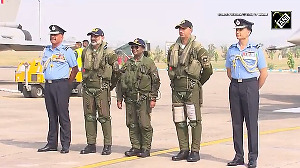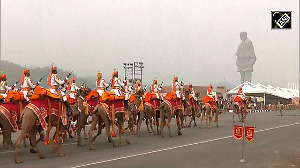Pakistan is on the brink. Armed insurgents are moving into new territories along the tribal belt on the porous Afghanistan border despite a strong reconnaissance by the Pakistani army.
The Los Angeles Times reported that militants are spreading their influence in areas previously untouched by fighting. In some cases, they are forging new alliances between outside groups and local insurgents, the paper said.
Armed with heavy weapons, militants made several brazen frontal attacks on army outposts mainly in North Waziristan.
"They've become better organised, more disciplined and more capable of initiating big attacks," said Rahimullah Yusufzai, an analyst in Peshawar told the paper.
Experts fear the outcome of the offensive will affect not only the course of the war in Afghanistan, where cross-border infiltration poses a serious threat to the US-led NATO troops, but also the US relations with Pakistan.
The paper said the offensive had been centered in North Waziristan, the most volatile of the seven Pashtun tribal areas that are described as federally administered, but are in fact beyond the writ of Pakistan.
At least 250 people died last month in clashes between government and insurgents. The fighting began after a 9-month-old truce between Taliban-backed tribal elders and Pakistan's military broke down last month. Under the ceasefire, Pakistani soldiers had remained in their bases and barracks, and the militants were supposed to have evicted foreign fighters and halted infiltration-style attacks into Afghanistan.
But al Qaeda and Taliban insurgents used the hiatus to rearm and reorganise themselves, said the paper, quoting a US intelligence report. Most armed confrontations take place in remote corners of tribal lands, where even most Pakistani nationals are not allowed to travel. Insurgents, sources said, often seize the offensive, mounting sophisticated attacks on troop convoys and military checkpoints.
However, the public seems to be sympathetic to militants. "There is a perception that the Pakistani Army is the servant of the Americans, who are kafirs [nonbelievers]," said Fazul Marwat, a professor and analyst at the University of Peshawar told the paper. "This makes it difficult to sustain public support" for operations in the tribal belt.
The army, too, is changing its tactics, by chasing down militants with helicopter gunships and sometimes staging air and artillery strikes, the paper said.
"We are succeeding," said Pakistani military spokesman Major General Waheed Arshad. "It may take some time, but we are certain we will prevail in the end."





